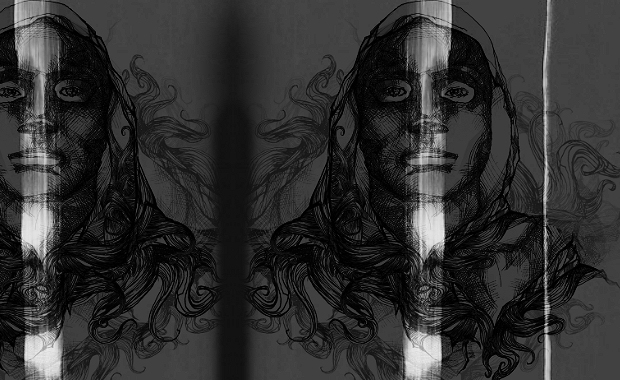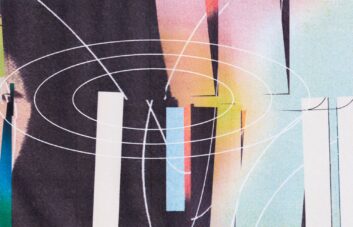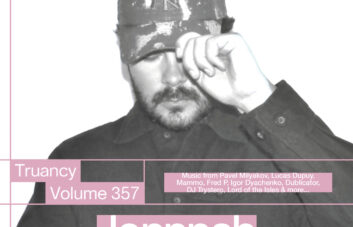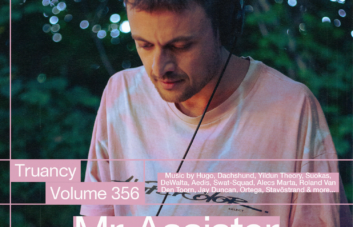Rivet stands on the inside looking out. Adam Rivet’s debut release, “Inside Looking Out”, was published by Naked Index, a sub-label of London label Frozen Border a label known for their high levels of obscurity. Naked Index, like Frozen Border, follows in the course of its predecessors obscurity. We ourselves might not have found the link between the two without the small contact details on the record’s cover. We keep returning to this EP, (which is not only Rivet’s debut but also Naked Index inaugural release), because of the rough, yet soulful commixture of stripped down techno combined with atypical harmonies, a little bit of that ’80s vibe here and there, and Rivet’s thorny, rhythmical percussion. Rivet’s first-rate work on “Inside Looking Out” has been described to provide basement pleasure for the later hours. We can relate to this much more now that we’ve heard his music out, however we initially found out about Rivet’s music while on the move. Rivet’s music works in a number of different settings: from Berghain persuasion to long walks through the city at dusk – maybe the way that his music translates so well to two such wildly different situations serves as the beauty of where his productions lies.
A few months after his Naked Index initiation, Rivet released his second record named “Running Thick” on the same imprint and our prayers for more frequent Rivet arrivals were answered shortly after. His Naked Index doublet was followed up by his prime remix for Kowton’s “Dirty Little Bomb” on TEAL Recordings, and the beginning of this year saw a gem of a hypnotic yet frenetic record named “Amid The Roar“ on Kontra-Musik with nobody less than Marcel Fengler on the redefinition. Apart from a handful of podcasts and releases present, we were still left in unknowingness about the man behind the music so, much to our pleasure, we arranged an interview with Adam in which we discussed a little bit of everything. We spoke about his musical background and present, the politics of dance music, his work ethos and a couple of his musical projects that he has coming up. There is another release for Kontra-Musik in the works, he has a record coming out on Skudge Records soon (“Grifter”/”Sundry”) and worked on a collaborative record with Blawan set for release on his and Pariah’s label Works The Long Nights. As if this isn’t enough to look forward to these months, Rivet has a lot of other projects drawing near too which you can read all about in our initiatory interview: a look from the outside looking in.
Stream: Rivet – Grifter (Preview) (Skudge Records)
Hello, could you quickly introduce yourself to the uninitiated? Adam: “I’m Adam Rivet, I make music that I hope speaks to both body and mind.” And how are you doing, what’ve you been up to? “I’m fine, thank you! I just finished my EP for Skudge Records which I am super happy about! Also been been busy preparing for the full-on DJ life. It’s a lot more paperwork than you’d want it to be, and those type of things aren’t exactly my strengths..”
From what I understand you’ve been interested in electronic music from a young age, and were already playing out house records at parties in your early teens. Could you tell us a little bit about your musical background? Was there a lot of music around the house you grew up in? “Yes, I think my mother had a big part in shaping me into a musically interested person so early on, when I was about four or five years old. She was always into dancing and had a weak spot for synth-based music such as Depeche Mode, Kraftwerk and Jean-Michel Jarre. And of course they were all vinyl records, so not only did I form a love for “futuristic” sounds but also the vinyl format. I did make attempts at a few instruments but it didn’t feel compatible with me until I got my decks at the age of fourteen. I started “producing” at age fifteen, but I can’t really say I did it seriously until I was about eighteen or nineteen years old. DJing has always been number one for me, and still is. Producing is kind of a by-product. That doesn’t mean it’s less important, both things are dependent on the other, but I can express myself more easily with the DJ craft (spontaneous and instant). Production is more of a drawn out process. This is especially true as I produce very slowly – on average I spend at least two to three months on a track.” When it comes to both art forms, was there anyone or any record in specific that triggered you to start? Or would you consider getting into production to be something natural that evolved out of DJing? “I had some older friends who were into the rave scene, and they brought me along to illegal rave parties. I guess that was the transition from my mom’s “friendly” electronic music to the proper party music. I can’t remember exactly what pushed me into DJing though.. but as you say, the progression into producing was definitely a natural part from that.”
You mention you work on tracks for a while. Is this because you create a lot of drafts and work on different projects, or would you rather classify yourself as a perfectionist with focus on one piece at a time? “Well, I do juggle a few tracks at once. I don’t spend eight hours a day for two to three months on that one track.. But I need to take a step back, often, to really hear what I’m doing. As in, not hear the track for five days, and then listen to it in another context; in the car, at a friend’s, through the phone speakers. It happens that I work on a track for a month, then suddenly realize it’s rubbish and scrap it or start over from the core. I don’t think it’s perfectionism as I don’t really sit and polish details. I just spend a lot of time trying to emotionally synchronize myself with the music. Ha! I wasn’t aware of this until now that you had me thinking about it. What an EMO poofster I am! I have a current example: I was having some really confusing and difficult (love) feelings for a person a few months back and I wrote this very melodic and emotive piece. A few days ago I opened up the song again to try and finalize it but I could barely stand hearing it, it was so painful and brought back all the sadness I had felt. I was about to delete it but thankfully managed not to. Hopefully I will be able to go back to it at one point and finish it.” I can hear how your music translates well to different settings: as much as I wild out when I hear someone play your tracks out, I listen to your music a lot at home too. How do you balance the two different elements of music for the dancefloor and music for the headphones? “Well I have played out a lot, so I think I know the basics of what works and what doesn’t. I never really play my own music out, once I finish the tracks I’m sick of them. Having said that, I do want it to be played in a club setting! I don’t really know what my focus is… Whatever comes, comes. I’m not that good with the engineering part of music making so I don’t feel a hundred percent in control of what happens. Half the time it’s just lucky mistakes or coincidences.”
Obviously don’t give away any of your secrets, but could you tell us a little bit about your set-up and any production rituals if you have them? “It’s just a computer and some controllers and the occasional borrowed bit of hardware, really… I do loads and loads of sound processing though, of “real” sounds that I record myself. And the post-production is all analogue with tape reel and the whole shablam.” Is producing an everyday occupation for you currently? “It’s definitely – and sadly – not a daily thing for me. I really do try and make it one, but as I said above I am too driven by emotion to be able to. Right now, I am three months behind schedule because I just can’t write at the moment. It has always been like that for me: write music non-stop for a month, then nothing for three months, then again it’s all music for a week and then nothing for another six months… I must be a nightmare for the labels to work with!”
Sometimes it takes a little bit of reading someone else’s writing, looking at someone else’s painting or listening to someone else’s music before any inspiration comes. How do you work at forcing yourself upon inspiration in these periods that you are producing? “I don’t, I just wait for it to magically appear! Peer pressure does work though, strangely. Sometimes when I am three days away from a deadline I get a creative frenzy and work non-stop for forty hours, which was something I really didn’t think would work before I started releasing. I always said to myself that I would never be able to write under pressure.” I do wonder if you listen to anyone else’s music before you start working on your own at all? ”Not consciously.. I listen to music constantly, which surely inspires me. But it’s nothing I really plan and/or analyze.” Is there a certain vibe that you feel like is best for you to work on music, you think? “At night, definitely. The more quiet the world is, the better.. And oddly I prefer working with headphones even though I have proper monitors. I get more ‘lost’ in it that way.”
Theo Parrish says that “to move forward, into the future, you have to know what’s going on in the past. Otherwise you risk redundancy, and who wants to be stuck in a form that keeps going around and around?” On the other hand, Omar-S claims that he never listens to anyone else’s music other than a handful of artists. Do you think that artists should have an awareness of what’s going on within their tradition, and why? “I think I’ll need to part with Omar there. For example, if we look at the current sound of the UK producers, to me a lot of it sounds like house/techno made by people who have no history in either genre – I could be wrong! I guess it would be possible as Theo says, that they would just make music that sounds like old music, but the odds for that are rather slim since so many parameters in music making have changed with time. And if we look at the Berlin techno producers who know their history, a lot of the time their music sounds like mid- to late-’90s UK techno but slowed down. I understand what Theo says and it works in theory, but in reality it seems to be the opposite way. And the crowd still is the most important, what is dance music without dancers? If they like it, what does it matter if it’s revolutionary or retrovert? The people who consider this important, me included, are nothing but a handful of old grumpy producers, contra thousands and thousands of dancers!”
Stream: Rivet – Metrist (Kontra-Musik)
Another quote, but now applied differently. In your most recent release – “Amid the Roar” – you include lines from Poe’s poem “Dream Within A Dream.” Is there any particular meaning or story behind why you chose those lines? “It’s about me and my headphone “bubble” where I sit inside, looking out. Amid the roar of the world around me. I don’t remember how or where I found that Poe piece but it’s been with me for many years.”
Many poets have long supported the sentiment that “all poetry is political”. Obviously, some poetry avoids explicit polemics and works within the subtext to develop any type of political message. Others have said that dance music is political. However, for some this seems to be a social sentiment sooner than it is a statement about the context of dance music. If dance music, like any other art form, is poetic then is dance music political? “Yes definitely, it’s definitely liberal. I don’t think any other genre has as little focus on race, religion, class, sexuality et cetera as dance music has. Everything is accepted in this scene, well, within boundaries of course… Have you ever heard someone say “I don’t like this DJ because he’s gay, black, muslim or whatever”? I haven’t in my 15+ years in the scene. Often I do wish that more artists would utilize the voice and ability to reach many people, with a little bit more than “FAT BASS EP #1”. I guess they just don’t realize how much of an impact they can have on the world or maybe they just don’t care. I shouldn’t be one to talk because I haven’t done much in this sense either but I haven’t been around for that long yet. My next EP is going to end poverty!”
Stream: Kowton – Dirty Little Bomb (Rivet Remix) (TEAL)
Ha, I have faith in you: Rivet The Yellow Hat. Moving on to some of your releases. You did an amazing remix for Kowton’s “Dirty Little Bomb” and I’ve heard that you have remixes for Nick Dunton finished, and a rave-y one that is set to be released on Kontra-Musik. “The one for Nick Dunton is nearly finished, it’s an honour to be working with him. He’s one of my childhood heroes. The one for Kontra-Musik is more of a filter disco house thing, I would say it’s very influenced by Thomas Bangalter’s solo stuff. I’ve been told it’s due right after summer.” That sounds lovely. Does the process of working on a remix differ a lot from working on one of your own productions? How do you approach them? “It doesn’t really differ much, as I usually find one sound from the original and work from that- which is what I do with my original music too. The problem with that is that the final remix has no resemblance to the original, which some people find okay whereas some don’t. Like the remix I made for Kontra-Musik, where I only used a hi-hat (and of course it’s in the same harmonic key) But I couldn’t really improve on the original if I would have stayed in the same mood and style so it felt better just going somewhere completely different. The Kowton remix is an exception though, there I forced myself to just vamp up the original a bit. I’d almost call that more of an “edit” than a “remix”.” If you look at other remixes as a listener, what makes a good remix in your ears? Can you give us some examples of producers who you think have cracked the formula? “I find that if the remixer stays in the same area as the original it usually ends up being a weaker version. I prefer it when they totally re-interpret the material and make something completely different. Surgeon does this a lot, which makes him one of the strongest remixers, and of course artists.”
Another question about forthcoming work – you’ve been in the studio with Blawan for a bit last month. How did this collaboration come about, what have you been working on? “Yes! Well, it was funny, I sent Jamie a message saying how much his stuff inspires me and he replied that he was just about to contact me saying the exact same thing! So, basically, anything but a collaboration would be wrong… We had a gig in Copenhagen together and we both took three days off before the gig and sat down together. It ended up in three tracks that are basically finished now. It’s going to come out on Works The Long Nights. Jamie’s such a machine, it’s amazing to watch him work. We had both been preparing sounds for a while before our “playdate”, and he was supposed to bring his on a CD, but it was corrupt! I kind of panicked, but he just said: “No problem, I’ll just make some sounds now.” I took a nap for about an hour and when I woke up he had made like twenty-five sounds and loops! I’m very anxious to get the EP out, it’s quite nasty. I’d call it Disco House From Hell.” How did you find the experience like of working with someone else – what were the dynamics of you and Jamie? “I have tried it in the past but it never truly felt like a collaboration, one of the participants was always dominant. Jamie is more technical so he did most of the actual “clicking”, but musically I feel that we contributed equally. I hope we get to work together more. Jamie can in seconds tweak a sound into Blawan-funk, it doesn’t matter if it’s a saxophone or a moose mating growl.”
Stream: Rivet – Sundry (Preview) (Skudge Records)
You have a release coming up on Kontra-Musik and of course “Grifter” and “Sundry” coming out on Skudge. I heard the previews, they are amazing – could you tell us a little about these two releases?’ “I’m supposed to do a lot for Kontra-Musik but sadly I haven’t finished anything at the moment. I really want to though, I love the label. Ulf, the label owner, has such an open mind – if I made a 4xLP album entirely based on my own bodily sounds he would be the only one except me to “get it” and totally support it! The one on Skudge is being pressed now! The guys behind Skudge are very, very specific about what they want so it was quite a long process to finish the EP for them. Many a time I cussed over it, but now that I see the final result I can totally understand what they were on about. I am definitely going to make more music for them, but with my slow work rate and their specific demands I’d be surprised if it’s out before 2019, haha.” With you being being the first and third release on Naked Index, are you planning on going back to the label? What’s your relationship with Frozen Border like? “I have nothing planned with Naked Index at the moment. As you probably know the Frozen Border camp is very secretive and mysterious. I haven’t been able to build a relationship with them even though I wanted to. Other than this, I have plans with two other labels as well, quite well-known ones, but I’m not allowed to say anything yet.”
We can wait for all of this even if we have to wait until 2019! On the topic of playing out records – how do you feel your DJing has progressed over time, and what’s the most important lesson you’ve learned in your time as a DJ? “For a very long time I was too into the actual technique and craft. A set-up with four decks, trying to go through sixty records an hour, etcetera. It was so important for me that I actually forgot to connect to the crowd which eventually turned it into a stress. It was all about performance and not about having a good time. The most important lesson I learnt was that in order for the crowd to have fun I must have fun as well. The majority of the crowd doesn’t care how quick or how technically challenging I play. What I do today is being much more mellow about it, and I truly enjoy playing now. I play stuff that makes myself dance and I mix whenever I feel it’s time. The connection with the crowd is so strong now. I still do the four decks thing but it’s only to give me the possibility, if the time is right, to really smash it out.” What do you love most about DJing? “I spend most of my hours awake on finding and listening to good music. I know that most people don’t have the time and/or possibility to do this and it’s frustrating to have all that amazing music for myself. The feeling of sharing with people is just priceless. I have something precious, and I want to share it with you. It’s like the saying: shared joy is a double joy.”
What makes a DJ set enjoyable to you as a listener? “Hearing new music, or hearing familiar music used in a new way. A lot of DJ sets bore me because I already know all the songs and I know how they sound mixed together… But a few people out there know that the possibilities are much bigger than just playing a big track after another.” Who are your favourite DJs and why? “My favourites change over time. In the ’90s it was Jeff Mills, Dave Clarke and Steve Rachmad. They really know the craft, hearing them play was like witnessing a force of nature. They really shaped the way I DJ. I always had a huge respect for Laurent Garnier as well, he can go from 90BPM to 180BPM in the same set and it all makes perfect sense! If I’d do that, half the crowd would go into psychosis and the other half would bottle me. I also really respect Surgeon, he is one of the very few who truly utilize the possibilities of the digital technology, whereas most people who use computers just do a lazy version of the two deck set-up. Lately I have been listening to mixes from Apparat and Four Tet a lot, they always put me into a trainspotter-frenzy. They play a lot of interesting, different music.”
And finally, when was the last time you danced and why? “I dance daily! When it comes to dance music, the way I decide if I like it or not is to ask myself the question, does it make me move? Friends and family often comment on when I do something (like washing the dishes), while there’s music on: I’ll do it in sync. It just happens. And that’s what this music is supposed to do to you, isn’t it?”
Interview by Immy Soraya. Many thanks to Jack Murphy, image is drawn by Juli Jah.





3 thoughts on “Interview: Rivet”
Comments are closed.